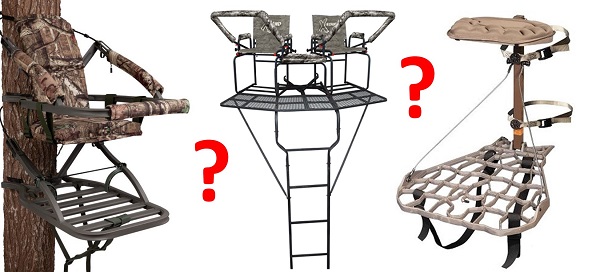The view from the top of a mountain is often worth the climb. But can the same be said about deer hunting tree stands?
If you love hunting whitetail deer, it’s worth the time to find out before you spend your hard-earned money on a new one.
But, how can you know which type of stand is right for you?
We’ve compiled a list of the different types of deer hunting tree stands and the pros and cons of each. We hope this will help you make the right decision on which tree stand to use on your next whitetail hunt.
Before you spend your money, learn about the various types of deer stands below…
You can click the links below to jump straight to specific tree stand types:
Ladder stands
Many whitetail hunters prefer ladder stands when they want entry into their hunting location to be as quiet as possible.
When set up ahead of time, ladder stands allow a hunter to walk quietly to their location without running the risk of metal clanging or of a sweaty setup that could leave unwanted scent on the ground and in the air.
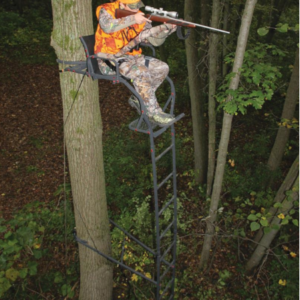
Ladder stands with shooting rails can be extremely useful for rifle hunters.
Quiet Entry
Some hunters believe that when compared to climbing tree stands, ladder stands allow for not only a quiet entry into the woods, but a quieter climb.
Because the stand is already set up prior to the hunt, access can be made without worrying about about assembly. (No loud scraping or searching for pieces and parts of multi-part climbing or lock-on stands.)
-
Sale!
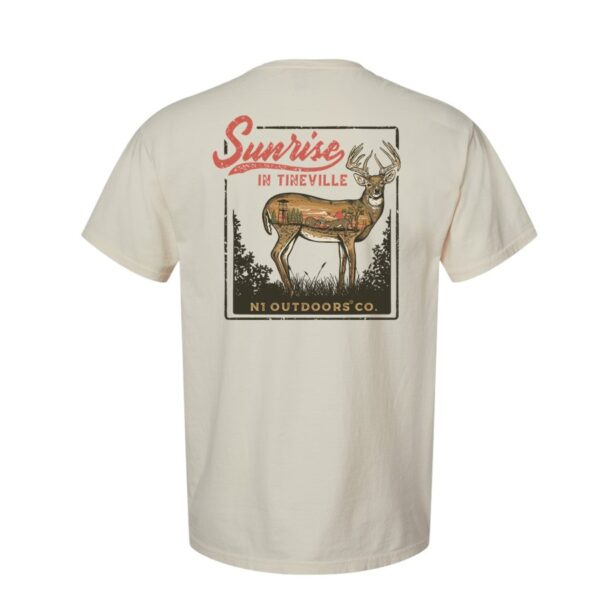
N1 Outdoors® Sunrise In Tineville™ Tee
Original price was: $28.99.$19.00Current price is: $19.00. Select options This product has multiple variants. The options may be chosen on the product page -
Sale!
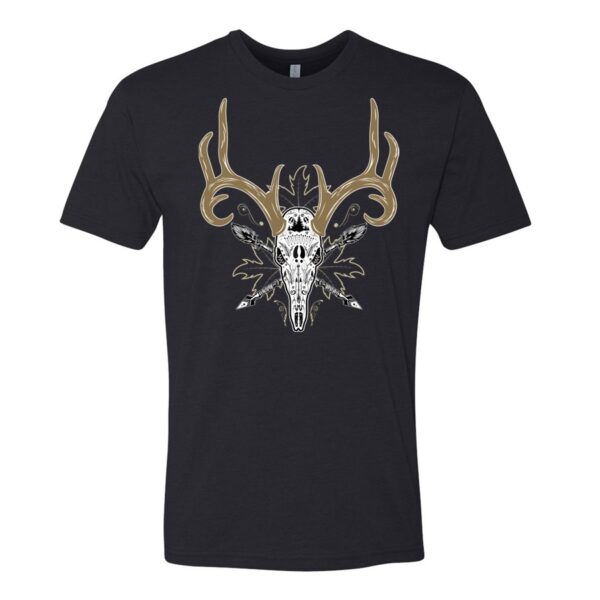
N1 Outdoors® Whitetail Sugar Skull Tee (Black/Columbia Blue)
$19.00 Select options This product has multiple variants. The options may be chosen on the product page -
Sale!

N1 Outdoors® Licking Branch Buck LS Tee
$19.00 Select options This product has multiple variants. The options may be chosen on the product page
Steady And Roomy
Some deer hunters also prefer ladder stands because they don’t feel as safe in climbing stands or fixed position stands like lock-ons. Or, they may simply be physically unable to use climbers or lock-ons.
Ladder stands tend to have large seats and side rails. If set up properly, they are typically secured well to a tree and very sturdy. Many come with the option of a shooting rail, which is a plus for rifle hunters. Ladder stands can also be used for bow hunting if shooting rail is removed.
There are also “buddy” type ladder stands which allow for more than one person to sit in the stand. This feature can be very useful for when you are teaching a child to hunt or hunting with a significant other.
Ladder Stands… Is The Setup Worth It?
Some hunters don’t like to use ladder stands for deer hunting because they can be cumbersome to set up and can be easy to spot if not concealed well.
If you have any problems on your hunting land with theft, you might not want to go with a ladder stand. While they can require some sweat to take down and haul out of the woods, a hard-working thief might be up for the challenge.
Ladder stands can also require a “cleaner” tree for setup, as opposed to lock-on tree stands, which can set up without having to cut as many limbs. Some hunters prefer lock-on or hang-on tree stands, as opposed to ladder stands, because ladder stands are typically 20 ft or shorter.
Ladder Stand Manufacturers
Some ladder stand manufacturers include:
- Millenium Treestands
- Muddy Outdoors
- Rivers Edge
- Big Game
- Hawk Treestands
- X-Stand
- API
-
Sale!
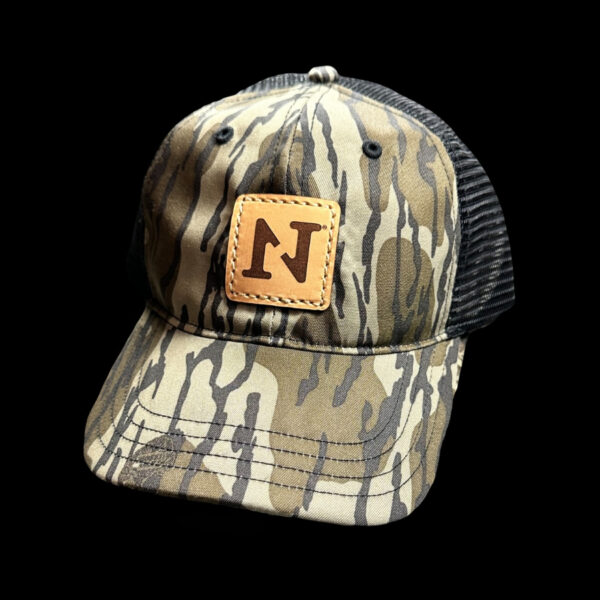
N1 Logo Leather Patch Hat (Mossy Oak Bottomland)
Original price was: $26.99.$19.99Current price is: $19.99. Select options This product has multiple variants. The options may be chosen on the product page -
Sale!
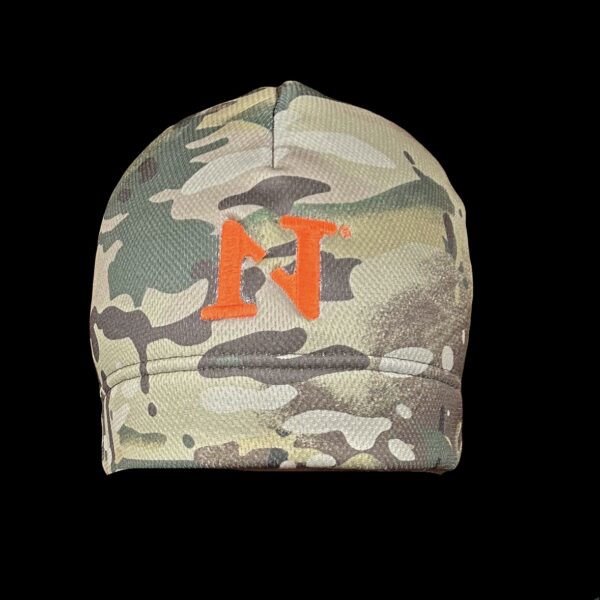
N1 Outdoors® Multicam Logo Beanie
Original price was: $17.99.$9.99Current price is: $9.99. Select options This product has multiple variants. The options may be chosen on the product page -
Sale!
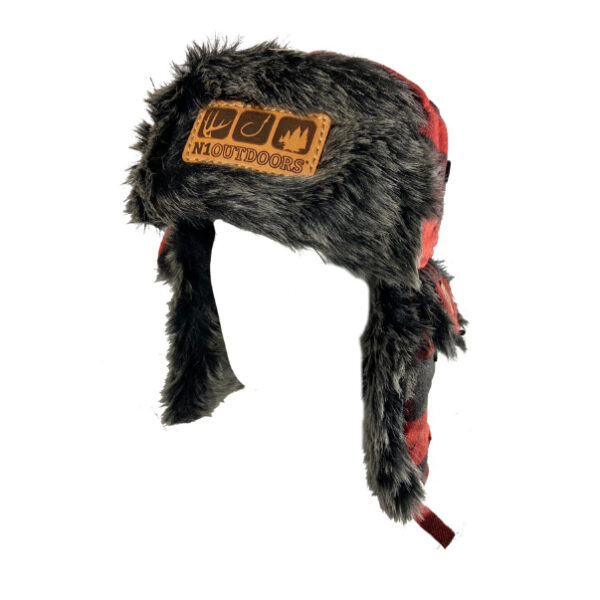
N1 Outdoors® Leather Patch Trapper Hat (Flagship design – various patterns)
Original price was: $29.99.$9.00Current price is: $9.00. Select options This product has multiple variants. The options may be chosen on the product page
Ladder stand Pros:
- No setup during hunt
- Quiet entry and climb
- Can be used for rifle hunting or bow hunting
- Some ladder stands can accommodate multiple hunters
- Less taxing physically to climb
Ladder stand Cons:
- Setup can be cumbersome
- Tree type can affect setup
- Theft possible
- Difficult to conceal
- Limited stand height
Not wanting a ladder stand… how about “fixed position” tree stands?
Fixed Position Tree Stands
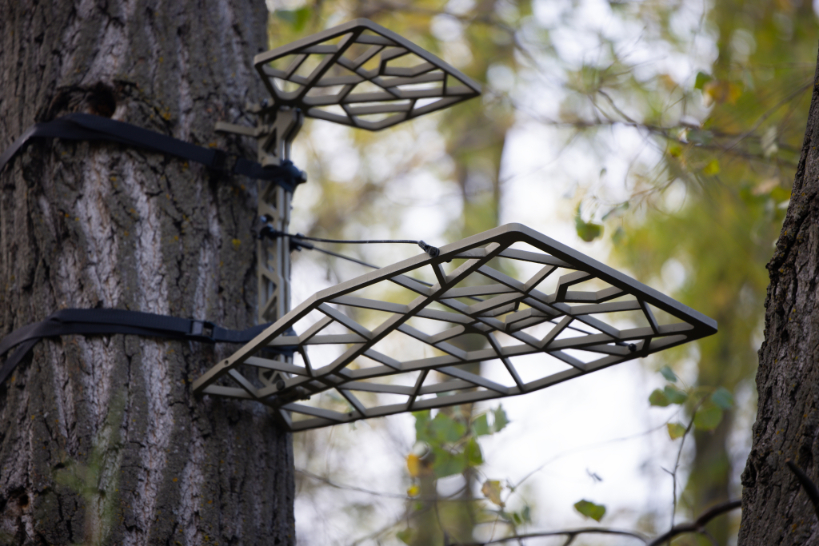
Fixed position tree stands, like the Element Hang On from Elevate Stand Co., are often quieter and lighter than climbing stands or ladder stands.
Fixed position tree stands include lock-on tree stands, sometimes referred to as hang-on tree stands. Lock-on tree stands are very useful when you know the exact location of where you want to have a stand.
For example, you may be hunting the edge of a food plot or attractant location that you know is traditionally well-traveled. Or you may want to have multiple stand locations set up, so you can hunt a particular stand based on current wind direction or deer movement.
Quiet, Light And Incognito
Lock on tree stands (or hang-on stands) are typically able to be set up quickly.
With the use of screw-in steps or stick ladders, they also are not as visibly disruptive to the hunting location as ladder stands can be.
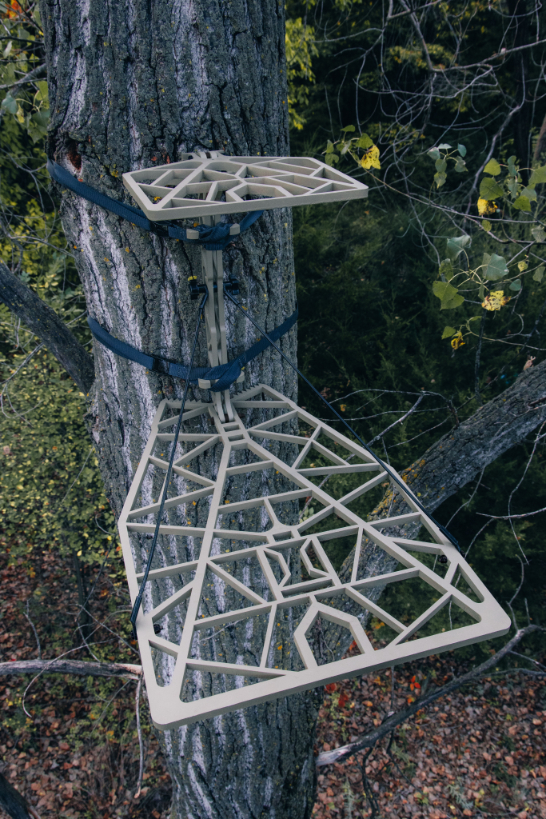
Fixed position tree stands have the advantage of being set up and left in position for the entire season, eliminating the need to pack in/out during every hunt.
While it’s not necessarily recommended to leave lock-on tree stands up year-round, they can be left up for the full season, allowing for quiet entry without disruptive noises that some climbing stands can produce. They also allow for a higher platform height than most ladder stands.
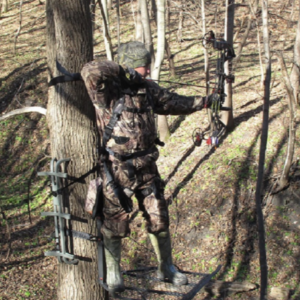
Lock-on stands are ideal for bow hunters, but if you feel the need to have a lot of standing room, you will want to choose a stand with a larger platform.
Lock-on stands tend to be much lighter weight than ladder stands, allowing for portability, easier pack and travel, and quick setup. Because screw-in steps and stick ladders can be used with hang-on stands, they also do not usually require as much limb trimming for that portion of the stand to be set up.
While lock-on stands tend to be conducive to bow hunters, without the use of a shooting rail, these types of tree stands can be difficult for a rifle hunter. And, while most don’t have side rails and other movement restrictions, that can leave some hunters feeling unsafe in the tree. (It is important to always use a safety harness when climbing up and down any treestand.)
Unless the hang-on stand you choose specifically has a large platform, limited foot space can be a concern for some hunters. So, if you like to have a lot of room to move around when standing, you should choose a stand with a larger foot platform.
Like ladder stands, lock-on stands can be the target of thieves. There are locking mechanisms available to serve as a deterrent, but a thief who is bent on stealing could still walk off with your lock-on stand due to its portability.
Lock-On / Hang-On Stand Manufacturers
Some notable lock-on tree stand manufacturers include,
Lock-On Stand Pros:
- No setup during the hunt
- Lightweight
- Compact and portable for packing and travel
- Quiet entry and climb
- Allows for better concealment
- Great for bowhunters
Lock-On Stand Cons:
- Can feel less safe
- Theft possible
- Some lock-ons have smaller foot platforms
- Some not conducive to rifle hunting
Still looking for your ideal tree stand? Read about climbing stands below…
Climbing Stands
Some hunters consider climbing tree stands (climbers) to be the most difficult to use. However, with proper practice and safety precautions, climbing stands provide hunters with some advantages in certain hunting scenarios.
Climbing stands can be very useful when you are hunting land that you may not be very familiar with. Climbers give a hunter the ability to search for a hunting location that is has favorable wind and also provides the ability to climb to a higher point without the height limitations of ladder stands, for example.
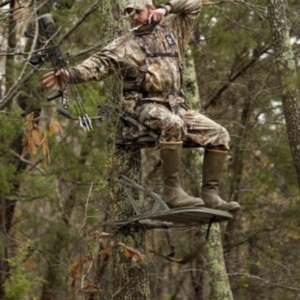
Climbing stands are great for portable hunting, but require the tree you are wanting to hunt from to be free of limbs that would restrict climbing.
Climbing stands typically allow for easy setup and removal, meaning that you can enter the woods with your stand and leave with it at the end of the hunt. This prevents theft and also allows a hunter to be truly mobile and not be limited to predetermined deer stand locations.
Climbing stands can also pose some challenges in certain hunting situations. Unlike lock-on stands, climbers need trees with either no protruding limbs, or few enough so that they can be trimmed on the way up the tree.
Climbers also work best when the tree being climbed does not have a large discrepancy in diameter from the bottom of the tree to the height at which the stand will be secured for hunting. If the diameter changes drastically from bottom to top, the hunter may have to begin the climb with the foot platform at an uneven, and even steep angle. This can make climbing not only difficult, but dangerous as well. A properly fastened safety harness should always be used during climbing and at all times when in the deer stand.
To Cover Or Not To Cover…
When it comes to cover, climbers provide both an advantage and a disadvantage, depending on the hunting location.
For example, you might have plenty of trees on a piece of property that allow for easy climbing.
However, if there are no other trees near the tree you want to climb to provide some cover for you while in the tree stand, you could find yourself sticking out like a sore thumb. And, contrary to what some believe, deer can and do look up at times, especially if they hear or smell something suspicious.
It’s a good idea to climb near cover, so if that buck of a lifetime comes, you are not left wishing you had stayed hidden.
Up, Up And Away…
Climbing stands can also be much more physically taxing than ladder stands or lock-on stands. And, the effort exerted can produce one of the most unwanted by-products during a whitetail hunt… sweat. A sweaty hunter is a smelly hunter. For this reason, some hunter choose other types of tree stands instead of a climber.
Because climbing stands have to be unpacked and attached to a tree, some hunters feel that the risk of metal clanging, and other unwanted noises, isn’t worth the mobility advantages they can provide. Once attached to the tree, climbing stands also will generate noise during a hunter’s climb up the tree.
-
Sale!

N1 Outdoors® Duck Camo Block Logo Heavyweight Hoodie
$34.00 Select options This product has multiple variants. The options may be chosen on the product page -
Sale!
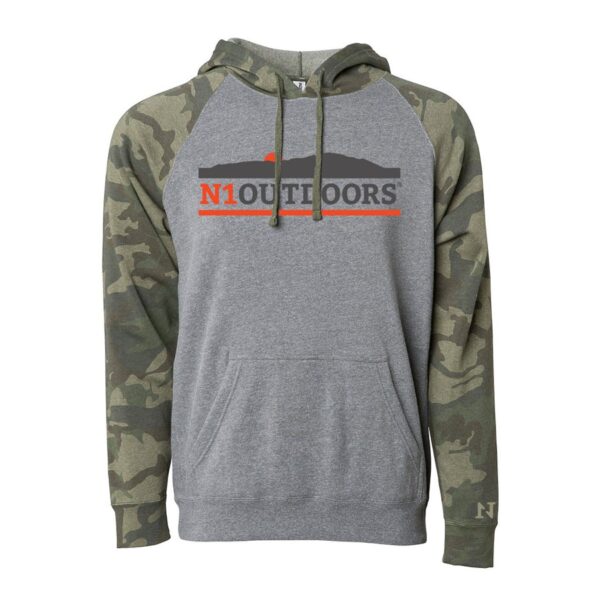
N1 Outdoors® “Sunset Mountain” Pullover Hoodie
$34.00 Select options This product has multiple variants. The options may be chosen on the product page -
Sale!

N1 Outdoors® Est. 2014 Forest Camo Heavyweight Sweatshirt Hoodie
$34.00 Select options This product has multiple variants. The options may be chosen on the product page
Climbing Stand Manufacturers
Some notable manufacturers of climbing stands include:
- Summit Treestands
- Lone Wolf
- Muddy Outdoors
- API
- Ol’Man
Climbing Stand Pros:
- Mobility
- Easily removable to prevent theft
- Climbers allow for adjustable hunting height
Climbing Stand Cons:
- Climbable trees needed
- Potential for noise / sweat
- Limited cover
- Physically taxing
Tree Saddles
Tree saddles are almost in a different category than other “treestands.” So, just how would you describe a tree saddle? Well, if you could imagine a cross between a harness for rock climbing and a hammock… that would be a hunting saddle.
Tree saddles provide the strength of a heavy duty harness but also are comfortable; like sitting in a hammock.
In many traditional tree stands, you sit facing away from the tree. However, with a tree saddle, you are sitting facing the tree, and therefore are able to use it for cover.
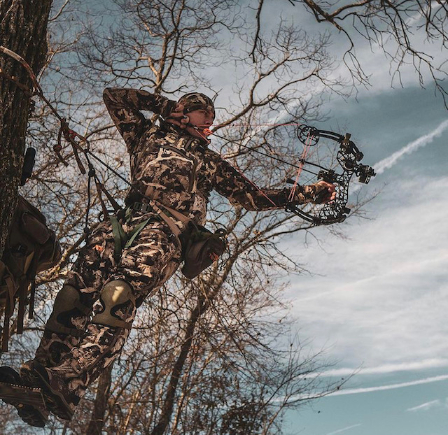
The ability to shoot in all directions is just one reason tree saddle hunters rave about them.
Are tree saddles safe?
Unfortunately, many hunters don’t use any type of safety device with their tree stands. But one of the major pluses of saddle hunting is that the hunter doesn’t have a choice but to be safe while using it. This is because a hunting saddle connects to the tree by way of a built-in safety device.
So, under normal conditions, and when used per manufacturer’s instructions, it’s almost impossible for a hunter to fall from the tree. Whereas, a typical safety harness is designed to catch you if you fall from a tree, a tree saddle is designed in such a way that prevents the fall from happening in the first place.
Are tree saddles comfortable?
If you’re going to be in a tree for an extended period of time, it’s normal to wonder, “am I going to be comfortable?”
The short answer is “yes,” tree saddles are in fact very comfortable.
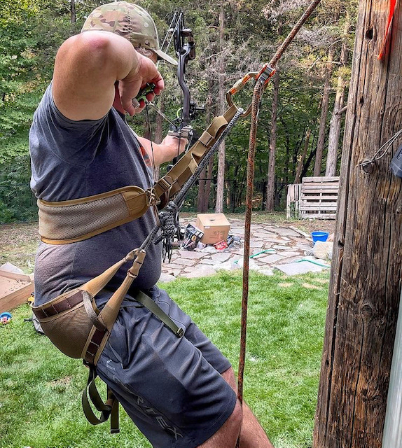
Once your body is “saddle ready,” tree saddles, like this one from Tethrd, can provide a very comfortable hunting experience.
Many users of tree saddles find that they are better the traditional tree stands. However, some can experience mild discomfort when using a tree saddle, such as “hip pinch,” or lower back discomfort, especially if they do not set up the saddle up correctly or if they use the wrong size.
Some users might experience discomfort simply due to pressure and angles that can be put on various parts of the body when hunting from a saddle. However, the more time you spend hunting from a saddle, the better your body will adapt to hunting from one. You will get in “saddle shape!”
-

N1 Outdoors® N-Tune™ Nock Tuning Reflective Arrow Wraps – Dropp’N Hammers™
Price range: $18.99 through $27.99 Select options This product has multiple variants. The options may be chosen on the product page -

N1 Outdoors® N-Tune™ Nock Tuning Reflective Arrow Wraps – Sending™
Price range: $18.99 through $27.99 Select options This product has multiple variants. The options may be chosen on the product page -

N1 Outdoors® N-Tune™ Nock Tuning Arrow Wraps – Mystery Pack
$12.99 Select options This product has multiple variants. The options may be chosen on the product page
Tree Saddle Manufacturers
Some notable tree saddle manufacturers:
- Tethrd
- Trophy Line
- Aero Hunter
Tree Saddle Pros:
- Increased safety over traditional ladder, climbing and lock-on stands
- The ability to use the tree as camo/cover
- Portability and ability to shoot from 360 degrees
- Lightweight
Tree Saddle Cons:
- Soreness if not used to using tree saddle
Final Thoughts On Types Of Tree Stands
If you are trying to determine which of these types of deer stands might be right for you, we hope you have found this post useful. Best of luck on your next hunt and please practice safe hunting and climbing!
If you want to read another type of hunting “stand,” check our our article on permanent hunting blinds.

